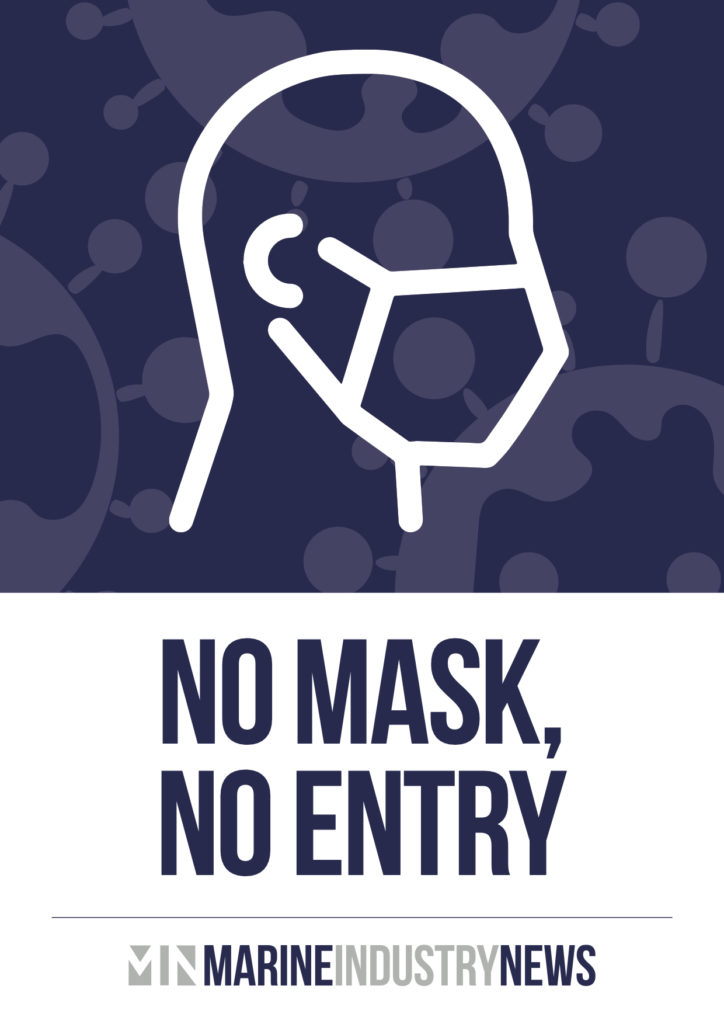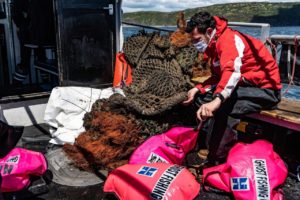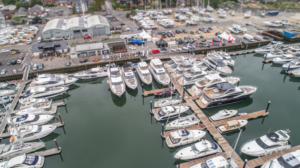Call for marine industry to lead the way with reusable masks
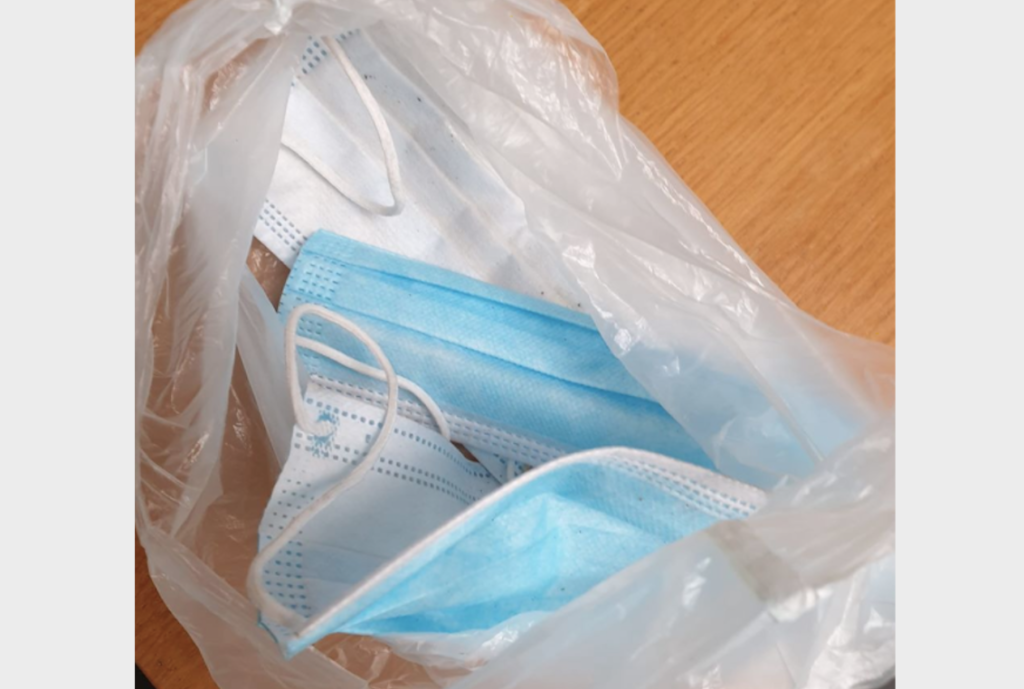
From July 24 we’ll all be wearing masks in shops and supermarkets. According to news reports, this ruling is likely to be in place until at least the end of the year and may be rolled out to offices.
But, aside from protecting the lives of people around us, masks come back with a big drawback – and that’s pollution. There are really worrying statistics being bandied around about the number of face coverings which could end up in the ocean.
For example, WWF Italy says that if only 1% of masks were disposed of incorrectly, this would result in 10 million masks per month dispersed in the environment.
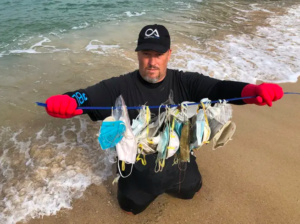
Gary Stokes, co-founder of OceansAsia
The effects of Covid-19 are already evident, with French non-profit group Opération Mer Propre describing disposable masks floating like jellyfish and waterlogged latex gloves scattered across seabeds in the Med. OceansAsia reported masses of masks being washed up on the Soko Islands, Hong Kong. Eric Pauget, a French politician, has referred to masks as ‘an ecological timebomb‘ due to their 450 year lifespan.
As millions around the world have turned to single use plastics to combat Covid-19, the fuse has been lit, and it’s our oceans that will suffer with unsightly litter in the first instance, followed by the degradation of the items and subsequent micro-plastics.
But conservationists warning about what might happen is not enough. It’s up to individuals and companies to take action, to insist on face coverings which are reusable, or can be disposed of in an effective manner (unless no other alternative is possible). Lightweight masks can be carried from land, boats and landfills by the wind, ending up as marine debris like straws or plastic bags. And no one wants to swim, sail or dive amongst that.
“We all need to stay safe during the Covid-19 pandemic and the marine industry has a crucial leadership-role to play in demonstrating how this can be done – whilst protecting the natural water environments upon which we all depend,” says Debbie Leach, chief executive of Thames21 (which campaigns for cleaner waterways). “In some of the most challenging working environments, the marine industry can show the way by rejecting single-use face masks, adopting re-usable masks as standard, and ensuring that there is no opportunity for these to be blown or washed into our rivers, estuaries and seas.”
During the last few months, discarded single-use face masks have already become a common sight on pavements throughout the country. The widely-available masks feature a layer of non-woven bonded fabric, commonly made of polypropylene, to filter microorganisms from the mouth and nose.
Although they keep out pathogens effectively, according to the Daily Mail, single-use masks have a long afterlife after they are discarded.
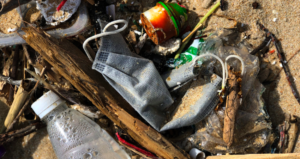 If every person in the UK used one single-use face mask each day for a year, it would create 66,000 tonnes of contaminated plastic waste, says Plastic Waste Hub, and ten times more climate change impact than using reusable masks. It says evidence suggests that reusable masks perform most of the tasks of single-use masks without the associated waste stream.
If every person in the UK used one single-use face mask each day for a year, it would create 66,000 tonnes of contaminated plastic waste, says Plastic Waste Hub, and ten times more climate change impact than using reusable masks. It says evidence suggests that reusable masks perform most of the tasks of single-use masks without the associated waste stream.
“There are some 67 million people in the UK and most of us will quite correctly be wearing face coverings and masks regularly,” Leach says. “Once the multiplier effect created by single use is factored in, it will only take a very small percentage of careless users to create a potentially devastating impact on our natural environment, particularly our rivers and seas where these items will congregate.”
In the years leading up to the pandemic, environmentalists have warned of the threat posed to oceans and marine life by skyrocketing plastic pollution. As much as 13 million tonnes of plastic goes into oceans each year, according to a 2018 estimate by UN Environment. The Mediterranean sees 570,000 tonnes of plastic flow into it annually – an amount the WWF has described as equal to dumping 33,800 plastic bottles every minute into the sea, according to The Guardian.
Last year, as reported in MIN, a sperm whale which had died after becoming stranded on a beach on the Isle of Harris in Scotland, was found to have 220lb of debris in its stomach including bundles of rope, plastic gloves, bags and cups. How long will it be before we see masks appearing in that list?
Disposable gloves are a similar challenge.
In the US, Maria Algarra was so concerned about the rise in plastic waste that she’s started a hashtag campaign called #TheGloveChallenge, according to The Independent. This asks people to send photos as a way to track littered gloves and raise awareness of the issue.
She says that since the coronavirus outbreak, she had seen dozens of plastic gloves floating in the bay, in parking lots, and on the Venetian Causeway bridges linking Miami Beach to the mainland.
As part of the campaign, Algarra has been sent 1,200 pictures of jettisoned plastic gloves – not only in Miami but in the boroughs of New York City and in Italy, Spain, Germany and New Zealand. A rough count adds up to more than 1,800 gloves in these pictures alone.
“The impact of Covid-19 on everyone has made us value our riversides, coasts and seas as never before,” Leach says. “The importance of access to them and the benefits to our health and well-being are well documented. But we are destroying what we value through the litter we leave behind. Single-use drinks bottles, food wrappers from picnics – and that new danger to the natural world, the single-use face mask. Blown in from vessels, left on beaches and river banks, they will blow or wash into the water and threaten the health and wildlife of the places we love.”
The internet has plenty of advice on how to make a face coverings out of T-shirts, scarves and even socks, and there are vast swathes of independent outlets offering cotton masks. As MIN’s previously mentioned, marine-themed ones from PADI and Thyra are also available.
Whichever method you choose – make your own, or buy reusable – it’s up to the marine industry to lead the way, and not to be seen in single use masks.
In the meantime, MIN has designed an A4 ‘no mask, no entry‘ sign which is free to download, and display in premises.

